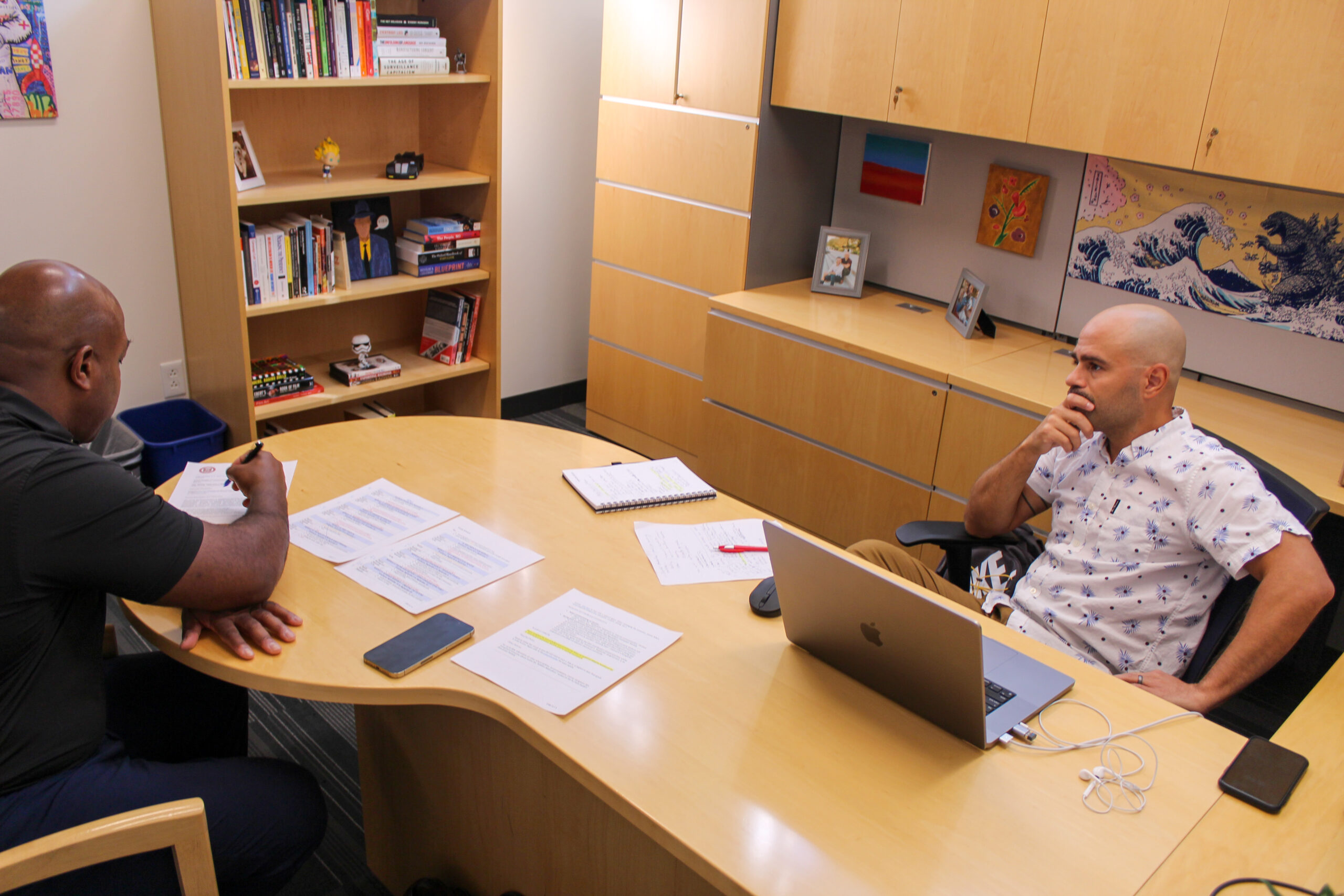Simply surviving the first few weeks of a new semester is an achievement for many in education.
But for Joe Cruz, Academic Director of Management & Organizational Change for WashU Continuing & Professional Studies (CAPS), reaching this milestone is an energizing beginning. Cruz’s focus is always on how to make CAPS courses even better for students.
That’s what CAPS Dean Sean Armstrong discovered when he visited Cruz in late September. As part of the quarterly Dean’s Day at Your Desk program, Armstrong spent several hours shadowing Cruz. The program allows the dean to gain firsthand insight into the work of front-line staff and instructors, helping him understand their needs and areas of focus.
Market responsive programming
When Armstrong arrived Cruz was reviewing and providing feedback on asynchronous student assignments. Attention quickly turned to improving CAPS course offerings, a key part of his role as chair of the CAPS Curriculum Committee. The work done by the committee is part of Dean Armstrong’s shift to provide market-responsive programming.
Cruz explained that the committee is currently focused on several initiatives to enhance the CAPS curriculum.
“We are developing rubrics to evaluate both new and existing courses,” Cruz said. “This ensures each course still serves a purpose and fits within the Bachelor of Science in Integrated Studies (BSIS). We are also conducting a comprehensive review to ensure that instructors are teaching what’s intended and that learning objectives are being met.”
Forging pathways to program completion
Another priority for the committee is creating a rubric to assess the level of writing required for CAPS courses. This would help identify alternate courses that could meet program-specific writing requirements.
“The goal is to define how much writing a student should be completing by the end of the semester,” Cruz said. “We’re also looking at non-English courses that could meet writing requirements. For example, a student might be able to substitute a sociology course for writing for public speaking, as long as it meets the same writing standards. This gives students more flexibility, especially if a specific course isn’t offered in a particular semester or they prefer something closer to their field.”
Dean Armstrong was excited by this approach, noting that it would provide students with more choices while maintaining WashU’s high writing standards.
“At minimum, our graduates should be able to write at the same level as undergraduates,” Armstrong said. “It’s not overly ambitious to expect someone who has been away from school for years to still meet WashU’s writing standards.”
Innovating course formats
Armstrong and Cruz also spent time brainstorming new ways to offer CAPS courses in more accessible formats. Using a syllabus from the Oral Communications course, they discussed breaking the course into three mini-courses. These shorter, more affordable courses could eventually add up to the same credit as a full course.
“Can we repackage our offerings in a way that shows we’re invested in a student’s professional development?” Armstrong asked. “Maybe we could offer these in a series where, if you take everything in the series, it is basically the three-credit course. It would be fantastic for somebody who doesn’t have the confidence to jump back into school with a full course load. Taking it in it in bits and pieces in a more digestible format to earn the credit. and then be able to get the credit.”
They agreed that CAPS should consider how it might use the process to create mini-course offerings in the future.
Working together for future success
Cruz mentioned that he meets weekly with instructional staff to share updates and align their efforts.
“Our weekly meetings are like a version of what we’ve done here today,” Cruz explained. “We share what we’re working on and identify where there’s overlap. Today, I’ll be updating everyone on the Curriculum Committee’s progress and how the United Way nonprofit management program is going.”
Cruz highlighted the success of the United Way program, a free nine-week offering for regional non-profit leaders, which has received excellent feedback. He suggested it might serve as a model for future professional credit modules.
“We are working towards having a portfolio of professional credit modules, sort of ‘do-it-yourself’ programs, modeled off of the United Way course,” Cruz told Dean Armstrong before joining the CAPS academic team meeting to continue planning for the future.
